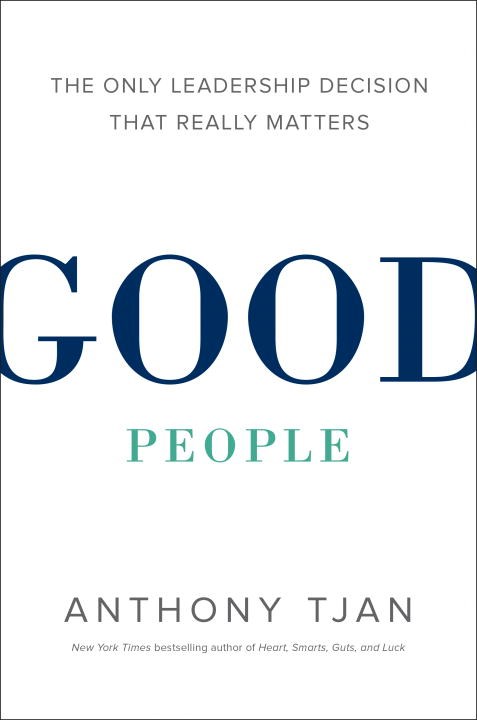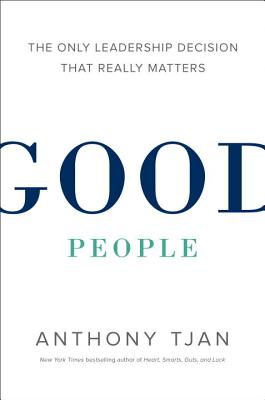Good People: The Only Leadership Decision That Really Matters
May 15, 2017
In Good People, Anthony Tjan explains how kindness and caring for others is good for business.

Based on the viral Harvard Business Review article, bestselling author Anthony Tjan argues that leaders have a new imperative: you must have competent people on your team—but more importantly, they must also be of high character. As a leader you need to help develop, and mentor for, character further.
In the excerpt below, from Good People:The Only Leadership Decision That Really Matters, Anthony Tjan explains how kindness and caring for others is good for business.
◊◊◊◊◊
In businesses, generosity is all too often boiled down to paychecks, bonuses, equity, and promotions. Extrinsic rewards are certainly important, but if these are the only means an organization has to express compassion for and genuine interest in its employees, then something essential is missing.
This will come as no surprise to students of evolution. In On the Origin of Species, Charles Darwin theorized that evolution is driven by heritable variation and natural selection. If in fact only the “fittest” survive, you might justifiably assume that our ancestors who held tight their resources and refused to share them were far likelier to survive and reproduce. But pioneering biologist E. O. Wilson argued that there was an exception to this rule. Wilson presented evidence that humans and ants are among only a handful of species that will sacrifice individual resources for the good of the group. But critically, this only occurred when humans or ants felt abundantly secure in their resources or lived in communities with robust norms of justice and fairness. On the one hand, humans are preprogrammed to acquire, hoard, and guard resources. On the other, we’re predisposed to share with and give to others, provided our own lives aren’t at risk and there is a culture that values fairness and justice.
A growing body of research supports the conclusion that practitioners of kindness benefit when they act generously. Plainly put, helping others makes us feel good. Ironically, altruism can at times be self-rewarding. My own personal experience has shown me that people are happier—even healthier—when their activities are invested with a purpose and meaning larger than themselves. Pro-social behavior is defined as any behavior that is intended to benefit someone or something other than oneself. But pro-social behavior can also have powerful reciprocal benefits for the practitioner.
Michael Norton, a Harvard Business School professor and member of its Behavior Insights Group, has observed that people both rich and poor experience greater pleasure spending money on others than on themselves. I once had the pleasure of moderating a panel with Professor Norton in which we discussed whether giving to others increases our own self-fulfillment and well-being. Norton described one experiment where he measured how much satisfaction and happiness research participants reported when they were forced to choose between giving a five-dollar gift card away or keeping it for themselves. Across the board, the people who surrendered their gift cards reported greater levels of happiness.
But that’s only five dollars, you might say. What happens when you increase the dollar value, or if you explicitly direct participants to give the money away? It makes no difference. Norton and his two colleagues, Elizabeth Dunn and Lara Aknin, found that happiness levels of participants stay the same even when they are told to be kind, when kindness is doled out randomly, and when the dollar amount in question varies. In fact, the only significant intervening variable Norton and his colleagues found was whether or not the money given away ended up being spent pro-socially. While it’s true income and happiness are correlated (up to a certain threshold), how we spend our money seems to be just as important as how much money we earn.
Generosity can also be exhibited through the gift of time and opportunity. In Adam Grant’s bestselling book Give and Take, the Wharton professor presents evidence that givers, “those who contribute without expecting anything in return,” almost always end up doing better because they end up getting the best of both worlds: doing well and doing good. He shows, for example, that the most collaborative and giving students at American medical schools also tend to achieve the most success after graduation. Pro-social behavior has a multitude of benefits. Acknowledging, recognizing, and helping employees can be just as effective as offering them monetary rewards.
To drive this point home, consider SAS, the analytics software company led by Jim Goodnight for nearly four decades which has consistently been identified as one of the country’s most admired workplaces. By providing benefits such as subsidized childcare, work-life balance counseling, health professionals, and onsite recreational activity centers, SAS signals that it cares about its employees’ health and happiness. In fact, Goodnight had been focused on creating a company culture built on employee trust and respect long before SAS rolled out these perks; for decades, SAS has offered employees meaningful flexibility and independence in their daytoday work. The most powerful demonstration of the company’s “generosity” occurred during the 2008 global recession, when Goodnight made a commitment not to lay off a single employee. That year, SAS also hit record profits.
Generosity benefits the giver as much as the recipient. This dynamic explains why companies that reward employees based both on merit (i.e., quantifiable performance metrics) and on ability to develop and care for others receive high marks in employee engagement and job satisfaction. Even in business, competition and compassion can be reconciled. In fact, one might go far as to say that having one without the other could be fatal to your company’s future.
Our self-awareness and compassion are what separate us from all other species. When we genuinely care for others—whether by getting to know them better as people or helping them develop professionally—we become entrepreneurs, who lead with both head and heart, and better overall leaders, who strive for the highest level of performance while also building relationships with employees. And it all begins at the top, with leaders who are unafraid to show compassion in their leadership approach. These leaders understand that only by working as hard to realize others’ potential as they work to realize their own can they transform entire industries, cultivate vibrant cultures, and produce enduring value.
Adapted from Good People: The Only Leadership Decision That Really Matters by Anthony Tjan
in agreement with Portfolio, an imprint of Penguin Publishing Group, a division of Penguin Random House LLC.
Copyright © Anthony Tjan, 2017.
ABOUT THE AUTHOR
Anthony Tjan is an entrepreneur, strategic adviser, and venture investor. Tjan began his career with McKinsey & Company before founding the pioneering Internet services firm ZEFER. He then served as Vice Chairman of the boutique strategic advisory group Parthenon (now Parthenon E-Y) and as senior strategic advisor to CEO of the Thomson Corporation. Today, Tjan embodies a people-first philosophy in his work as CEO of the Cue Ball Group and as chairman of MiniLuxe, a lifestyle brand reimagining the nail salon industry. Tjan is the author of Good People and co-author of the New York Timesbestseller Heart, Smarts, Guts, and Luck.


